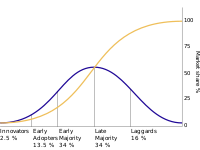
Photo from wikipedia
In this paper, we explore the impact of a firm's workers' replacements on innovation performance, by using rich matched employer-employee panel data for the Veneto region of Italy. We take… Click to show full abstract
In this paper, we explore the impact of a firm's workers' replacements on innovation performance, by using rich matched employer-employee panel data for the Veneto region of Italy. We take the well-known resource-based theory of the firm as our departure point, and develop a set of hypotheses which we test empirically with negative binomial regressions. Coherently with our theoretical framework, we find that workers' replacements significantly dampen innovation performance, because they generate losses in the tacit knowledge base of the firm. We also nd that workers' replacements are especially detrimental to large and young rms, because large companies have more hierarchical rigidities and innovative capabilities in young rms are mostly dependent on specific human capital. Finally, our results show that firms' localization in industrial districts significantly mitigates the negative impact of workers' replacements, and that a similar picture emerges when firms are more exposed to knowledge spillovers, particularly of related knowledge.
Journal Title: Research Policy
Year Published: 2019
Link to full text (if available)
Share on Social Media: Sign Up to like & get
recommendations!